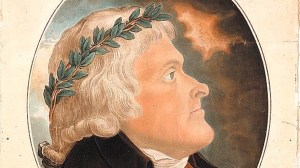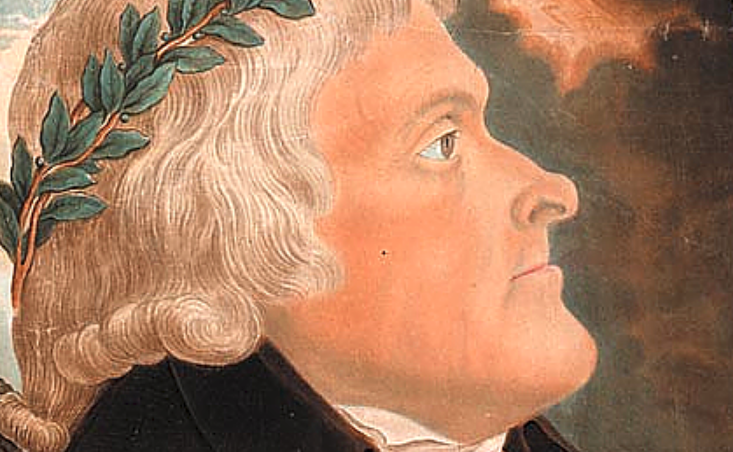 Here are recommended essays regarding Thomas Jefferson (April 13, 1743 – July 4, 1826) on The Imaginative Conservative:
Here are recommended essays regarding Thomas Jefferson (April 13, 1743 – July 4, 1826) on The Imaginative Conservative:
Looking for Mr. Jefferson by Clyde Wilson
Thomas Jefferson’s Birthday by Clyde Wilson
The Jeffersonian Conservative Tradition by Clyde Wilson
Thomas Jefferson, Conservative by Clyde Wilson
From Union to Empire by W. Winston Elliott III
Was Thomas Jefferson a Philosopher? by Eva Brann
The Declaration of Independence: Translucent Poetry by Eva Brann
Thomas Jefferson & the American Declaration of Independence by Ross Lence
Thomas Jefferson, Whig Historian by Bradley J. Birzer
Thomas Jefferson, Pole Star of Discovery by Bradley J. Birzer
Jefferson Was Right by Joseph Sobran
Calhoun, Jefferson, and Popular Rule by Lee Cheek
Excellent biographies of Mr Jefferson:
Jefferson and His Time – Dumas Malone 6 volume set
Mr. Jefferson by Albert J. Nock
More on “Thomas Jefferson” on The Imaginative Conservative (including quotations from Mr. Jefferson)
Temperate, sound in morals, sound in taste, learned in more than one discipline, open-handed, ready to fill great offices at personal sacrifice and then to retire modestly to Monticello—this was the genuine Jefferson, no doctrinaire egalitarian, no abstract intellectual…Jefferson indeed was a Whig through and through, with the virtues and the defects of the breed. Joined with this Whiggery was another facet of his character…a bitter partisanship, not overly scrupulous…Jefferson could be ferociously emotional in politics.—Russell Kirk (pg. xvii, introduction to Mr. Jefferson by Albert J. Nock)
Jefferson and his friends came to power (the “Revolution of 1800”) in opposition to the economic and moral imperialism of Hamilton and his friends—a program of taxes, manipulation of the economy for the inevitable benefit of the few and the burden of the many, moral dragooning of the population, and involvement in foreign power politics. It was this threat that Jefferson and his friends put down, and kept down, for half a century—the happiest era of the Union.—Clyde Wilson (Thomas Jefferson’s Birthday)
Jefferson, despite the show of French ideas which he made from time to time, founded his idea of liberty and justice upon the writings of Coke and Kames and the other English juridical writers, and upon the tradition of English freedom from the Anglo-Saxons down to the 18th century.—Russell Kirk, Program for Conservatives
Among the agrarian and democratic Republicans looms the angular figure of Jefferson, whose doctrines always were more radical than his practice and far less extreme than French notions of liberty…as his talents were immensely varied, so did his character display odd and sometimes inconsistent facets…Yet for all this, and for all his acquaintance with the philosophes and his affection for France, Jefferson had Coke, Locke, and Kames for his real political mentors; and, like them, he had half a mind to be a conservative—and sometimes more than half a mind for it.—Russell Kirk, The Conservative Mind, p. 73.
This essay was first published here in April 2011.
The Imaginative Conservative applies the principle of appreciation to the discussion of culture and politics—we approach dialogue with magnanimity rather than with mere civility. Will you help us remain a refreshing oasis in the increasingly contentious arena of modern discourse? Please consider donating now.
The featured image is “Thomas Jefferson by Tadeusz Kościuszko, Copyprint of colored aquatint by Michał Sokolnicki. It is in the public domain and appears courtesy of Wikimedia Commons.


